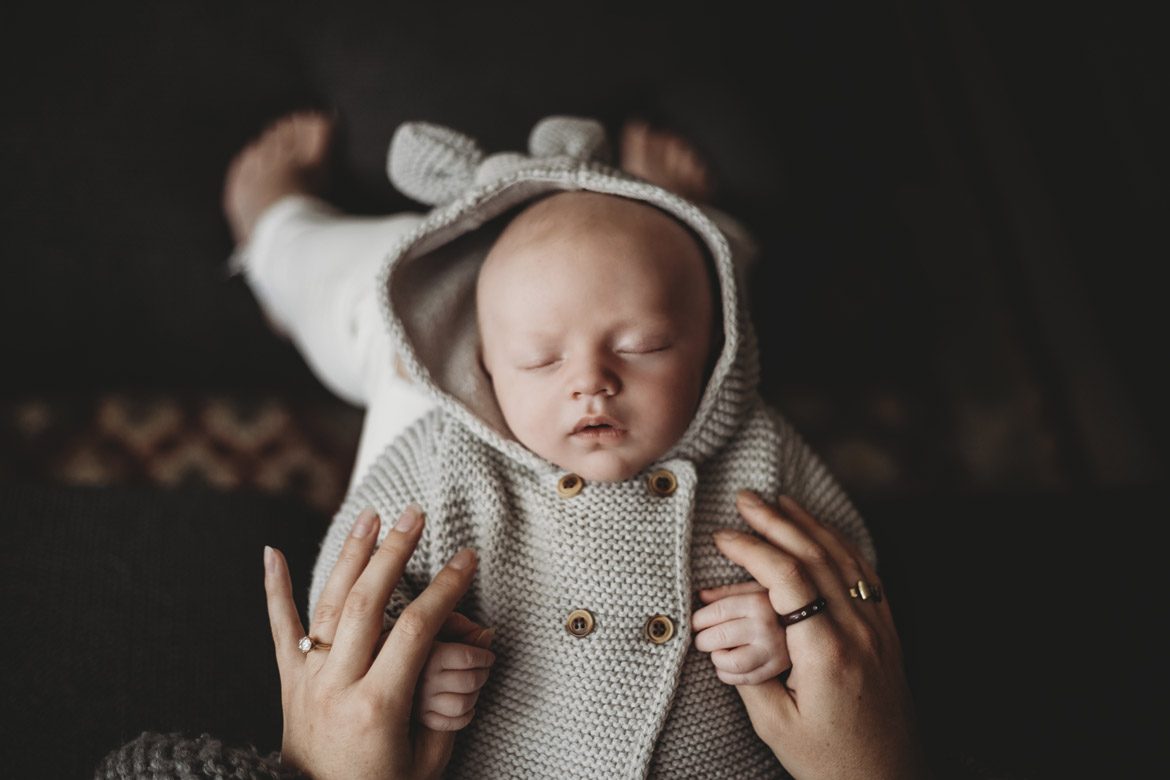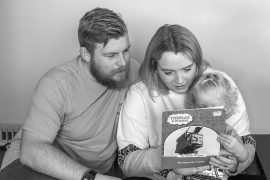By Jenny Thomas
I’m going to start charging anybody who asks the parents of one of my patients “Is your baby sleeping through the night yet?” The answer to the question, while it seems polite enough, often leads to a judgment of how we’re doing as a new parent. We have enough judges. Plus, the answer is almost always “no” and physiologically, that’s the right answer. Most children don’t sleep through the night because they are built that way.
The “let them cry it out, is the nursery ready, put that baby down you’re spoiling him” culture can also undermine our parenting efforts. Our culture encourages independence from a very young age and says that normal babies were never meant to be held all the time, and were meant to sleep all by themselves.
Biologically, anthropologically, psychologically… our newborns weren’t meant to sleep alone. They were born to be held. Newborn infants are not supposed to be sleeping through the night.
Normal Sleep
Let’s understand normal sleep. Probably the two most important stages of sleep are stage 4 sleep and REM (rapid eye movement) sleep.
In stage 4, you are completely unresponsive, with a disconnection between sensory information coming in and your ability to receive it. You can’t hear people taking to you, you don’t know your bladder is full, you don’t smell smoke, and you can’t tell if tigers are around. This is the prevalent sleep stage of the first part of the night, and the more tired you are, the longer you spend in stage 4 sleep. You have a really hard time being awakened or awakening from stage 4 sleep. Kids with disorders of stage 4 sleep will have sleepwalking, sometimes bedwetting, or night terrors.
In REM sleep, you have a complete loss of muscle tone. That’s a good thing, since you dream in REM sleep, and if you acted out your dreams you could really hurt somebody or yourself. REM sleep happens towards the last part of the night. You can wake up easily from REM sleep. Kids with disorders of REM sleep have nightmares.
The stages of sleep, and there are more than just stage 4 and REM, are things we go through each night, but we go through them in cycles. Every 90 minutes of so we actually wake up, check out our surroundings and go back to sleep if everything feels safe. Awakening about 5-8 times a night is normal.
Biologically, anthropologically, psychologically… our newborns weren’t meant to sleep alone. They were born to be held. Newborn infants are not supposed to be sleeping through the night.
So, as sleep has developed, one of the major issues surrounding it is safety. We could comfortably enter stage 4 sleep because other people were around us to keep us safe, and at least one person was probably in lighter stages of sleeping so that they could warn us if tigers were around. That sense of connection is really important to us now even though we aren’t really worried about predators. We were designed to be social sleepers.
Normal babies
We spend so much time dreaming of what our children will be and very little time realizing what they are.
Let’s say, for the sake of argument, that human evolution is like a football field. Human beings as a genus start at the far end of the field, and we as a species show up at about the opposite 10 yard line. At about the one inch line (and that’s generous) we as an industrial society show up. Why am I rambling about this? Because we have to understand that the way we do things is a new idea… but the babies we bring into this world don’t know about the way we do things. They are programmed to do things that human babies have been doing for thousands of years.
And human babies are really vulnerable. If you’ve ever seen what baby elephants or horses can do at birth, you know that they can walk shortly after birth, and are running soon afterwards. Why can’t humans do that?Well, if we waited until the brain was mature enough for our kids to walk, the baby’s head would be too big to come out safely. We don’t need to run to stay safe. Our gestation period is designed to make sure that our kids arrive in the world with their future intact — our kids arrive in the world when it’s safest for the brain to come out.
Our children arrive in the world as the most neurologically immature primate of them all, and remain the most dependent on a caregiver for the longest period of time. Our kids can’t keep themselves warm, get food, walk, speak, or reason. They can’t manipulate us and they can’t consciously choose to make you look like a bad parent.
What do we know about their sleep patterns? Well, they need to be near a caregiver — mostly mum. It makes sense if you think about it. This immature baby, with little in the way of self-preservation skills, needs to hang out with the source of food and warmth, with the person who is most likely to wake up to meet the needs that they express in the middle of the night. There are beautiful videos of mums and babies who are almost totally in sync in terms of sleep cycles, showing them waking at about the same time several times during the night, with mum responding to the baby and the baby, who rarely cries, getting their multiple needs met. There is also good evidence that shows that children sleeping near mum have less time in stage III and IV sleep.
Normal babies sleep during the day and are up at night, at least for the first several (6-8) weeks. That is normal and expected and nothing we can do to change that. That means that parents need to sleep when the baby is sleeping to avoid all the great things that go along with sleep deprivation. Older infants get up at night, but less often, and it is normal for one-year-olds to not be sleeping through the night. Of course, if I did my job earlier, you now understand that nobody sleeps through the night. Interesting tidbit: one study showed that about 80% of parents of one-year-olds identify their children as having “sleep problems”. Eighty per cent? Maybe we have an expectation for our children that is not based on human physiology and is therefore not realistic. Our current culture doesn’t help us set realistic expectations for normal.
How ’bout this idea that we have to teach our kids to “soothe” themselves? I would argue that a several-month-old child is still not able to feed themselves, find food, or do any other thing that it would take to live independently. The process of self-soothing would seem to require more than the basic survival skills babies have. They are speaking up because they need something. If they need something, even if it just to feel safe, why shouldn’t we help them? Do we really need to teach a two-month-old independence? Why should they do it by themselves? Because we are taught that self-soothing is normal and important. It is. Not in this age group.











